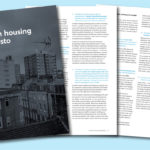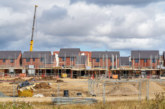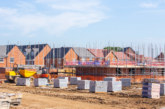The next Mayor of London should launch a major programme of affordable housebuilding, review the green belt and develop a ‘fair and transparent’ approach to rent setting. This is according to a housing manifesto by the capital’s dedicated think tank, released ahead of the mayoral election on 7th May 2020.
The manifesto, Capital Homes, argues that London has two big housing challenges. Housing supply is failing to keep pace with London’s growth, leading to an increase in overcrowding, and housing is increasingly unaffordable to Londoners on low and modest incomes.
To push up supply, the manifesto calls on the mayoral candidates to commit to:
- Launching a major programme of building affordable housing, using government funding — or a ‘London Housing Bond’ supported by housing benefit payments, which could be used to build 25,000 affordable homes a year, with government backing.
- Undertaking a long-term review of London’s green belt, with the aims of managing release of land to build well-connected new places, preserving London’s urban character, and enabling access to open space for Londoners. Government should permit and support such a review.
- Piloting zoning-based planning for major sites, to broaden the market of developers enable wider public engagement in planning, using existing tools such as permission in principle, and lobby the government for a more comprehensive review of planning processes.
- Incentivising denser development in ‘station intensification areas’ and use call-in and development corporation powers to ensure that these are delivered. The manifesto argues that as London continues to make the case for Crossrail 2 and the Bakerloo Line Extension, establishing a systematic approach to densification and realising its benefits will be essential to realising the potential of these schemes.
- Supporting London’s boroughs to build more housing, enabling inter-borough collaboration, and supporting modern construction methods (eg, modular homes) through joint buying initiatives.
Owner-occupation levels are rising, but two-thirds of young Londoners are still reliant on renting. London’s tenants need a better deal, with more security, and rents that reflect the costs of living in London. The next Mayor of London should promote affordable renting and enable home ownership, by:
- Promoting longer-term tenancies with index-linked rents, and support abolition of Section 21 evictions so that rents can be challenged in tribunals. While the Mayor would depend on government support for rent controls, landlords should be encouraged to give tenants longer-term tenancies that index rent rises to inflation rates for three to five years.
- Exploring personalised rents for build-to-rent and other new development. Personalised rents base rents on a proportion of household income following deductions for essential costs. This approach allows for rents to rise and fall as tenants earn more or their personal circumstances change.
Lobbying government to help private renters to buy from their landlords
Richard Brown, Deputy Director at Centre for London said: “Housing is London’s fundamental challenge. High housing costs push working Londoners into poverty, makes entry-level jobs inaccessible for young people from out of town and makes people in the rest of the UK feel alienated from their capital. Housing is a risk for London’s status as a centre for global headquarters too, by acting as a deterrent for internationally mobile professionals.
“London’s housing problem is complex and long-established. Tackling it will not involve a single solution, but a concerted campaign of action. The next Mayor of London must work with boroughs, housing association and developers — with the backing of the government — to address supply, affordability, security and quality.”









